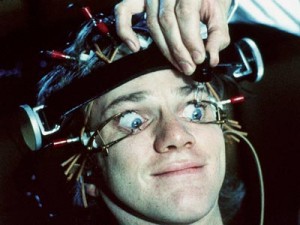This week I’m back on principal duties with the Firebird Chamber Orchestra in Miami for, among other works, John Adams’ ubiquitous Shaker Loops. Completed the same year I was born, 1978, this string orchestra score was instrumental [sic] in moving the genre of minimalism beyond its strictest forms through a more fluid treatment of tempo. This is by far my favorite selection from the Adams oeuvre, and as with most pieces of the idiom, it is deceptively difficult. The natural inclination is to pulse with the bow at the quarter-note level to ground the oft-running sixteenth notes, but this tendency also interrupts the musical flow on which the piece is hinged.
What stands out to me in this, my second performance of Shaker Loops (the first being a wild romp with ensemble dal niente), is the distinctly different way in which the player is required to concentrate. After our initial performance on Wednesday, the first comment from a player after the final bow was, “I think I blinked three times, max!” With the nerves of an opening night show, most eyes were buried in parts for fear of losing place on the page. The experience is something like a street-side game of Three Card Monty. Take your eyes away for even a split second and all is lost until the next meter change or penciled-in cue…for the first concert at least.
Back to the brain, though, I discovered an interesting phenomenon in rehearsing this piece which is that focusing the eyes too acutely within each measure has the same disorienting effects as losing concentration all together. The balance that seems to result in the most consistency, for me at least, is put only about 30% of available brain power on the measure itself, another 30% on the overall phrase (say eight measures or so) and the final 40% on phrasing and musicality. Performance nerves seem to skew this ratio toward a hyper-focus on 1-3 measures of music, but in this approach sight begins to blur not unlike staring at patterned wallpaper too closely. Committing to the rough percentages above of course happens more naturally over time, but with an abbreviated rehearsal schedule it requires nothing short of a vow.
Our Firebird bassist, Logan Coale, tracked down a documentary featuring the composer himself rehearsing and conducting the septet version at the 2002 La Jolla Music Society’s SummerFest, entitled A Precise Process. Some interview answer grandiosity aside, it is a compelling examination of what Adams’ priorities are in the well-known score. Ensemble issues in these rehearsals highlight pitfalls inherent within the piece, as well as the impulse to nudge larger beats in the effort to keep everyone on the train. My goal for the next four performances? To shake it not like a Polaroid picture, but like a Zen monk.

